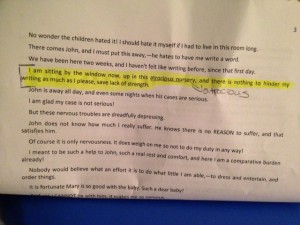An unreliable narrator works under the constraints of limited knowledge to convey information that may seem justifiably suspect to the reader. It is obvious throughout the story that Charlotte Perkins Gilman is an unreliable narrator because of her downward spiral. I have collected three quotes from Charlotte Perkins Gilmans story “The Yellow Wall-Paper” to help assist in my accusation of Charlotte being an unreliable narrator.
- “I have watched John when he did not know I was looking, and come into the room suddenly on the most innocent excuses, and I’ve caught him several times LOOKING AT THE PAPER! And Jennie too. I caught Jennie with her hand on it once.”
It is clear that the narrator is going crazy. I believe the narrator is soothing her own thoughts of being crazy by making herself believe that John and Jennie could possibly be obsessed with the wall-paper like she is. This is a great example of the narrator being an unreliable narrator because she is giving great detail to insignificant point all through-out the story.
On a side note I have to point out the obvious point of the narrator’s insanity being the use of capital letters. I believe the narrator places the emphasis on certain words to convey a certain feeling.
2. “It is getting to be a great effort for me to think straight. Just this nervous weakness I suppose.”
It is clear that she has gone overboard. The narrator cannot even think straight. This is a clear sign that reality is slowly starting to diminish from the narrators life and mind. The narrator is obviously unreliable here because she is not ashamed to state the she is succumbing to the weakness that she possesses. She should not have nervous weaknesses that effect her to the point of thinking straight.
3. ”I sometimes fancy that in my condition if I had less opposition and more society and stimulus -but John says the very worst thing I can do is to think about my condition , and I confess it always makes me feel bad.”
The narrator has a “condition” this is an obvious sign that she cannot be trusted because
we do not know when she allows her condition to take over and do the actions and
speaking from her condition rather than from herself. She is an obvious unreliable
narrator.
1. “Dear John! He loves me very dearly and hates to have me sick. I tried to have a real earnest reasonable talk with him the other day, and tell him how I wish he would let me go and make a visit to Cousin Henry and Julia.”
In this quote you can see that John is not having a strong enough effect on the narrator. He is not getting through to her because she is obviously delisional. This is a great quote to show the dynamics in their relationship. She says “He loves me very dearly and hates to have me sick”, it is very clear here how crazy she is and how in control John is in ways.
On a side note the narrator here says that she tried to talk to him which is also a good signal for their relationship. She should not have to try to talk to him, talking to him should come with ease.
2. “John does not know how much I really suffer. He knows there is no REASON to suffer, and that satisfies him.”
In this quote you can see how the narrator keeps her emotions from John. She is truly depressed and she is holding it back from John. John does not realize how sick she is internally. He does not pick up on all of her signs that she is crazy. This is a good example of the dynamic of their relationship because once again you see the narrator in the shadows of Johns understanding.
3. “He said I was his darling and his comfort and all he had, and that I must take care of myself for his sake and keep well.”
In this quote you can see how selfish John is because the narrator makes it very clear that John is not going to help her at all. She is going to have to do everything for herself. This is a good representation of their relationship because it highlights the key problems I believe they have. She says he says that she is his everything yet she needs to take care of herself. This is a very selfish move.
Utopia- an ideal place or state
Dystopia- a society characterized by human misery, as squalor, oppression, disease, and overcrowding
I believe that “The Yellow Wall-Paper” is a dystopia to the narrator because she is in a world like no other. She is miserable and in this pretend world in her imagination that is driving her crazy. Noting about the narrators world in “The Yellow Wall-Paper” resembles a utopia to me. Not to mention the whole story was based out of her home.
In the story “The Cottage” I believe it is a utopia compared to “The Yellow Wall-Paper”. In the cottage the main setting is outdoor which is more utopia like than the grim home with the wall-paper.
The question of utopia brings a lot of thoughts into my mind regarding “The Yellow Wall-Paper” and “The Cottage”. Going along with my answer above for utopia and dystopia it is clear how one story is set in the outdoors where the other story is trapped to the confinements of the narrator’s home. These different settings come into play when thinking about the mood of the whole story over all. It is easy to put a positive and negative connotation just because of the setting.




